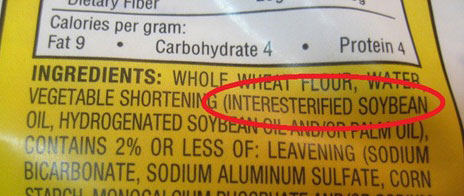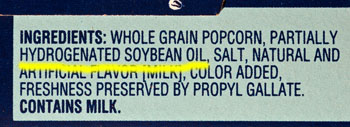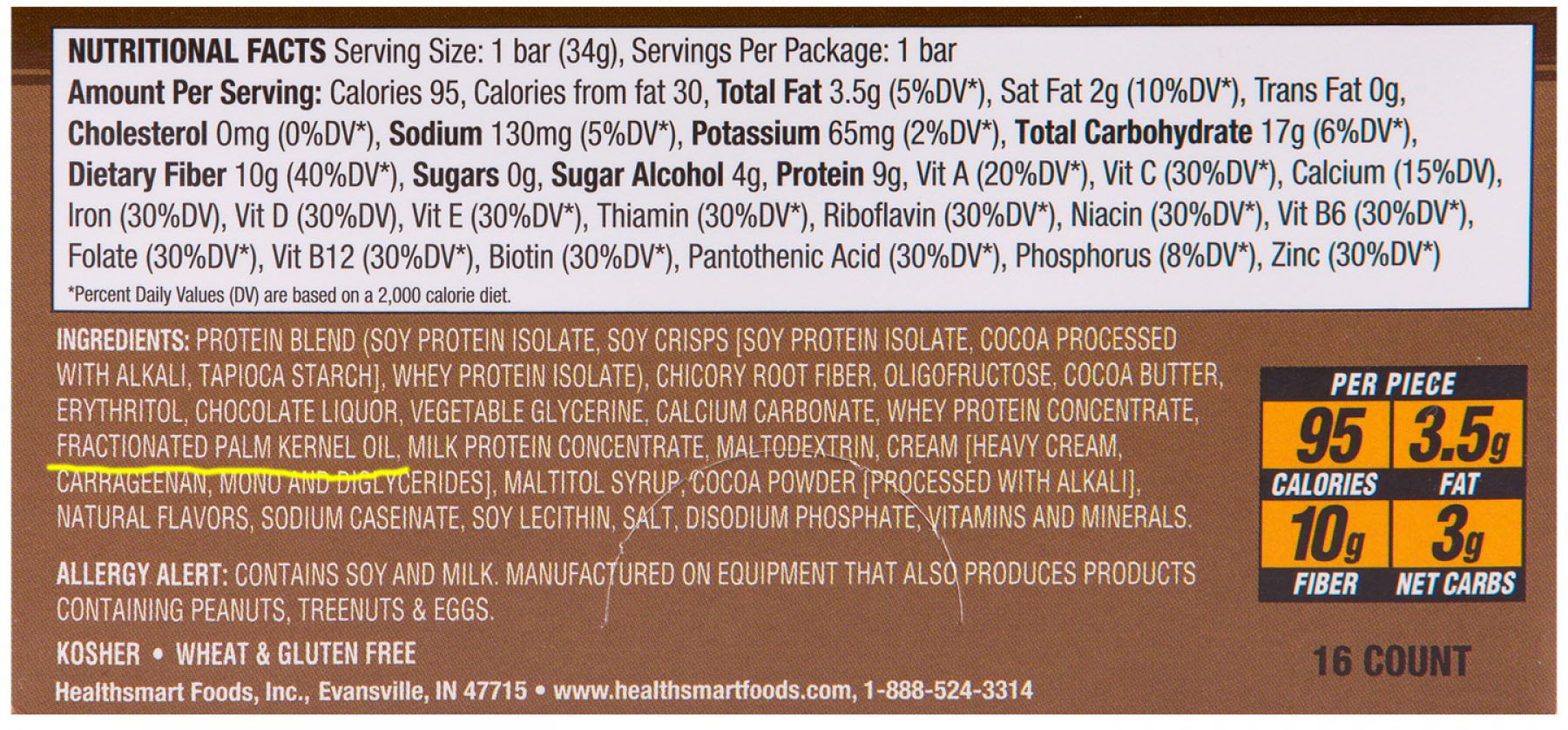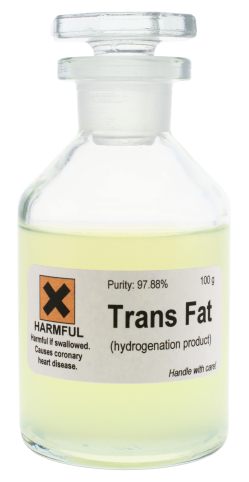
Yet again the food industry would seem to be putting profit before safety. The carcinogenic effects of fat hydrogenation, with its trans-fat byproducts have finally been recognized by the regulators and they are slowly being removed from our food. However, some of the alternative manufacturing methods have even bigger health risks than the toxic processes they are designed to replace.
All commercial industries have at their core the basic requirement to make money for their shareholders. However, for some industries, such as food and drink, the drive to cut costs and increase profits is put ahead of ethical concerns such as animal welfare and even human safety.
Regulations and food labelling are designed to keep consumers safe, but, heavy influence from industry slows down the regulators ability to respond to issues. It has taken nearly 30 years for the health concerns associated with trans-fats to be fully recognized and for regulators to publicly question their safety.Food labelling is woefully inadequate, and without a degree in chemistry many of the ingredients listed on labels are completely meaningless. Savvy consumers are forced to keep themselves up to date with the latest ingredients, and their host of alternative names, to preserve their health from the impact of corporate greed.
Fat Stabilization
Shelf life, or spoilage, is a major source of financial loss for the food industry. Many preservatives, stabilizers and additives are added just to increase the length of time food can be kept on the shelf. This is what makes processed food cheaper than natural ingredients; they can be kept for years with minimal loss. However, the cost to your body of ‘stabilizing’ the food can be huge.Fat is often added to food to improve texture and our perception of the taste.
Evolution equipped our brains with a desire to consume fat and the food industry commercializes this innate behavior and fat is added to almost all processed foods. Usually when fat is heated to high temperatures during processing, or kept for long periods of time, it goes rancid. Rancid fats taste ‘off’ with a stale taste that would put people off eating the food. Therefore fats are selected which are more stable, with higher melting points and more saturated bonds, as they less likely to oxidize and become rancid. The most commonly used fats in processed food are cheap vegetable oils that have undergone processing to artificially increase the saturation, for example hydrogenation.
Many of the issues associated with processed food are as a result of the adulteration of natural fats and sugars into substances the body simply can’t recognize. This lack of recognition causes the immune system to react to the unnatural food substances leading to a state of inflammation. Over a prolonged period this chronic inflammation causes the immune system to attack the body itself and reduces its ability to fight infections and prevent cancerous cells spreading.
Fat Processing
There are 3 main types of processing which fats undergo to make them more stable.
1) Hydrogenation

The most well-known method for processing, and stabilizing, fats is hydrogenation. Chemically adding hydrogen atoms changes vegetables oils from liquid ‘unsaturated’ fats to solid ‘saturated’ fats, i.e. they are saturated with hydrogen. This change in physical properties increases stability and melting point and is used to produce substances such as margarine. Unfortunately during the processing the natural configuration of the fat, the physical arrangement of its atoms, can be displaced from what is termed ‘cis’ configuration, to ‘trans’ configuration. This accidental ‘trans’ by product is much more common in partially hydrogenated oils.
The health concerns associated with ‘trans’ fats have become sufficiently apparent that the FDA has now called for a ban on partially hydrogenated fats. Unfortunately ‘trans’ fats are created in other processes including total hydrogenation.
There are numerous health issues associated with trans-fats: they raise levels of ‘bad’ cholesterol and reduce levels of ‘good’ cholesterol (both are lipoproteins but with different weights and functionality); they increase the risk of Type 2 Diabetes by inhibiting the insulin receptors; they lead to immune reactions which cause a whole host of other diseases; they impact the cardiovascular system and have a role in cancer development. Specifically men are at a greater risk of cardiovascular problems while women’s risk of breast cancer increases significantly when ingesting these toxic byproducts.
2) Interesterification
Due to the known health issues of trans-fats the food industry has been searching for new processes which produce the same low cost, stable, fats. One method is interesterification which involves using chemical catalysts to add the fatty acid stearic acids to oils. Fats comprise a glycerol ‘backbone’ and three fatty acid ‘tails’ and they can be chemically modified. By replacing natural fatty acids and increasing the percentage of the more stable stearic acid the whole fat becomes more stable. Unfortunately this process too includes hazardous waste products, chemical residues and carcinogenic hexane molecules.
Since the process of esterification is relatively new less research has been done but studies have already found that the fats have a worse impact than partially hydrogenated fats. Specifically they elevate blood sugar by as much as 20% in one month. The pancreas is also specifically affected and insulin production is impacted, which is specifically dangerous for those at risk of diabetes or who already have the disease.
3) Fractionation

An alternative process, also intended to reduce the creation of trans-fats is called fractionation. During this process the fat, such as palm oil is heated and separated into two different ‘fractions’. One has a higher melting point than the other. The fat with the higher melting point is more stable and therefore more desired by the industry and added to many baked goods.
The process of heating the fats destroys almost all the nutritional content including anti-oxidant qualities and vitamin E. Specific health concerns about the fats produced in this process have not yet been raised, but it is likely that the heating of the oils and industrialized processing could be generating more unnatural fats. Consumers must decide if consuming fats produced by this process is worth the risk.
The Future of Fat
Saturated fat got a lot of bad press but the negative propaganda only told half of the story. If you have elevated blood sugar due to diabetes or a diet high in refined and processed foods, saturated fats can cause problems. Chronic inflammation caused by eating processed foods damages blood vessel walls. The body attempts to repair the damage using ‘good’ cholesterol as a patch, kind of like a Band-Aid.
This ‘sticky’ cholesterol has a tendency to accumulate saturated fats and can form a blockage. Although it is saturated fats which create the blockage, the underlying problem is the chronic inflammation and arterial damage caused by the processed foods, in particular sugar.
However, if you eat a diet rich in natural ingredients and avoid the processed junk, then saturated fats are fine. Even those that got a bad press in the past such as butter or even animal dripping are relatively harmless, especially when compared to processed food. Additionally much of the clinical data which showed problems with saturated fats was contaminated with ‘trans’ fats so cannot be relied upon.
If, like many people, you have completely lost faith in the food industry, and its regulators, how do you ensure that what you eat doesn’t impact your health? Simple, eat natural food. Avoid food which has had lots of processing, is packed full of ingredients you don’t understand and has a long shelf life. Nature packed fruit, vegetables, nuts and seeds with all the ingredients to keep us healthy. It is only when we mess about with profit making industrialized processing that dangers are introduced. Butter is great for spreading and is much healthier than you have been led to believe and coconut oil is excellent for high temperature cooking. Stay safe, eat natural!
Now that you have learned about the 3 Processed Fats to Watch Out, you might want to find out the 4 foods to never eat for breakfast.. Go to the next page to access the research on the 4 foods to never eat for breakfast.
About the Author:
Emma Deangela is the best selling author of The Alkaline Diet Program and 80/20 Fat Loss. She has helped over tens of thousands of men and women to lose weight and transform their health with sound nutrition advice.
Do you look out for these ingredients in the nutrition label? Which wonderful friends in your life would appreciate the 3 Processed Fats to Watch Out?
Please help them by sharing this eye-opening article with each of them using any of the social media and email buttons below.


Leave a Reply